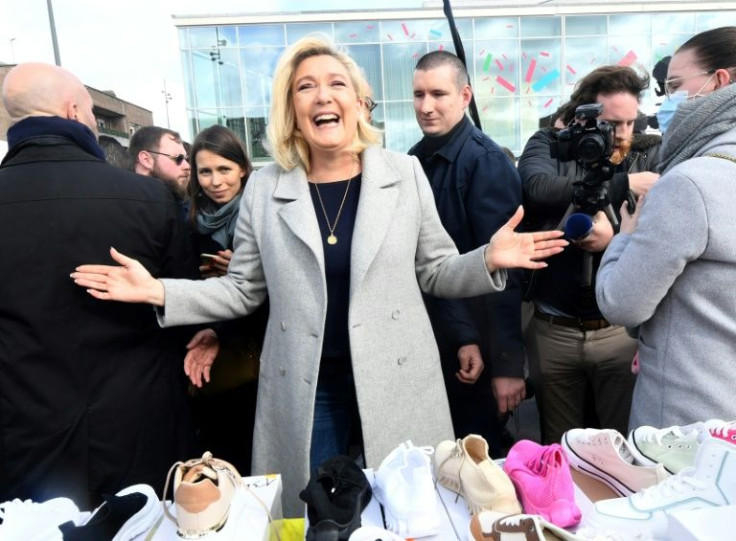Marine Le Pen Stages Comeback In French Polls With Softer Image And Working-Class Themes

Marine Le Pen's softer image and new status as a working-class champion have fetched her laurels ahead of the French presidential polls in April after the far-right National Rally party leader distanced from her earlier pugnacious anti-immigration and eurosceptic rhetoric.
Many had written off 53-year-old Le Pen, a lawyer by profession, after her thumping defeat to current French President Emmanuel Macron in 2017's runoff vote.
Her current rise is attributed to ditching unpopular plans to drop the euro, skipping reference to immigration on her social media accounts, and shrugging off past connections with Russian President Vladimir Putin, who received her at the Kremlin before her earlier poll campaign.
For years, Marine Le Pen "admired" Putin. She is vocal in questioning the impact of the EU sanctions on Russia, terming it "political suicide" due to increases in the prices of gas, raw materials, and foodstuff in the 27-member trade block.
She did not hold Ukrainian President Volodymyr Zelenskyy, the western poster boy for war, in high esteem. "I think he is behaving like a head of state and it shouldn't spark our admiration, it should be normal behavior," she had said in an interview.
When Russian President Vladimir Putin annexed Crimea or allegedly poisoned opposition leader Alexei Navalny, the far-right leader was tight-lipped.
As her Russian courtship resulted in a backlash she made a climbdown following a barrage of media reports and criticism from opponents. Apart from condemning the invasion of Ukraine, she is currently a core member of the global campaign to endorse Zelenskyy.
Le Pen attended a speech by Ukrainian President Zelenskyy to the French parliament on March 21 in her capacity as MP.
Le Pen has closed the gap on the current incumbent Emmanuel Macron ahead of the election, stated two new polls. Macron is hoping to be the first French president in 20 years to win re-election.
Earlier, Macron managed to put up a brave fight in the two-round election. But his estimated margin of victory has dwarfed sharply with Le Penn staging a comeback ahead of the final round runoff on April 24.
A March 28 poll by the Ifop-Fiducial group predicted Macron winning by just 53 percent versus 47 percent for Le Pen.
The next day, another poll by Ipsos Sopra-Steria, awarded Macron 56 percent against Le Pen's 44 percent. In both polls, Le Pen is up by around three points in a week.
"I have never been so close to victory," Le Pen told Le Parisien newspaper in an interview published before the polls.
She has tied up her poll campaign to the economic problems faced by low-income families and the working classes and put her traditional themes of Islam and immigration on the backburner while Macron's campaign is met with plenty of complaints about inflation and rocketing fuel prices.
She also refused to entertain the preposterous theory of Great Replacement which predicts the predominantly white and French Catholic population being replaced by non-white immigrants from Africa and the Middle East.
Macron is struggling to defend the costly fees charged by consulting firms such as the US-based McKinsey. Under his watch, the total value of contracts for consulting firms doubled between 2018 and 2021, reaching more than $1.1 billion last year, a record in French history, and earned Macron the title of a 'president of the rich' by opponents.
Forty-four-year-old Macron defended his government's use of consultants more than their predecessors. Macron is accused of paying millions for advice on what was criticized as a slow rollout of the pandemic vaccines.
In her interview with Reuters, Le Pen described herself as "neither of the left nor the right", a strategy used by Macron in the 2017 campaign, during which he promised to bridge the traditional left-right gulf.
Until 2017, the French presidential polls were a three-cornered fight between candidates from Les Républicains, Leftist Parti Socialiste, and far-right National Rally.
But Macron's 2017 victory disrupted this setup. A former minister in a Socialist government, Macron successfully rallied the centre-Left and centre-Right electorates and created a realignment of party politics. The traditional divide between the Left and Right currently stands vanished.
Will Le Penn do a Macron whose re-election is the most likely scenario today?





